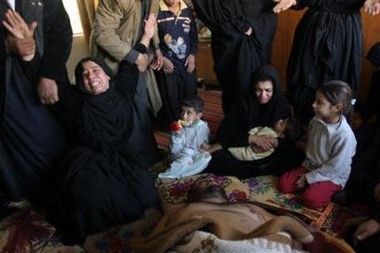|
Iraq insurgents kill senior Sunni leader
(AP)
Updated: 2005-11-23 18:59
Gunmen wearing Iraqi army uniforms broke into the home
of a senior Sunni leader on Wednesday and killed him, his three sons and his
son-in-law on the outskirts of Baghdad, his brother and an interior ministry
official said.

Relatives mourn near the lifeless body of a
close family member of Khadim Sarhid al-Hemaiyem, in Baghdad, Iraq,
Wednesday, Nov. 23, 2005. Gunmen wearing Iraqi army uniforms broke into
the home of al-Hemaiyem Wednesday and killed him, his three sons and his
son-in-law on the outskirts of Baghdad, his brother and an interior
ministry official said. Khadim Sarhid al-Hemaiyem was the leader of the
Sunni Batta tribe and the brother of a candidate in the Dec. 15 election,
the ministry official Maj. Falah al-Mohammedawi said.
[AP] |
Khadim Sarhid al-Hemaiyem was the leader of the Sunni Batta tribe and the
brother of a parliamentary candidate in the Dec. 15 election, the official Maj.
Falah al-Mohammedawi said. Another of the slain man's brothers said the family
has been attacked before.
"A group of gunmen with Iraqi army uniforms and vehicles broke into my
brother's house in the Hurriyah area and sprayed them with machine gun fire,
killing him along with three sons and his son-in law," said his brother, Nima
Sarhid Al-Hemaiyem. "His eldest son was assassinated one month ago in the Taji
area, northern Baghdad, when unidentified men shot and killed him."
Al-Mohammedawi said government forces were not involved and the investigation
was focused on insurgents.
"Surely, they are outlaw insurgents. As for the military uniform, they can be
bought from many shops in Baghdad," he said. "Also, we have several police and
army vehicles stolen and they can be used in the raids."
The slaying follows a big push by U.S. officials to encourage Sunni Muslim
participation in the upcoming election, which will install the first
non-transitional government in Iraq since the 2003 invasion. Some Sunni-led
insurgent groups have declared a boycott of the election and have threatened
politicians who choose to participate in it.
The Batta tribe is one of Iraq's largest Sunni tribes from the area north of
Baghdad, where they are influential. Dozens of people went to al-Hemaiyem's
home, where the bodies were laid out, wrapped in blankets before the funeral.
Also on Wednesday, the U.S. military announced a new operation with Iraqi
troops in predominantly Sunni western Iraq. The operation launched Tuesday in
Ramadi, 70 miles west of Baghdad, is aimed at preventing insurgents from
interfering with voting there, a U.S. military statement said. It is the third
operation in Ramadi since Nov. 16.
U.S. Marines announced Tuesday the end of a major operation to secure towns
along the Syrian border used by al-Qaida to smuggle foreign fighters into Iraq.
Ten U.S. Marines and 139 insurgents were killed in "Operation Steel Curtain,"
which began Nov. 5 with about 2,500 U.S. troops and 1,000 Iraqi soldiers, a
military statement said.
U.S. commanders plan to establish a long-term presence in the area to prevent
al-Qaida and its Iraqi allies from re-establishing themselves in the towns of
Husaybah, Karabilah and Obeidi along the Euphrates River.
In a positive development, a senior government official said a representative
of an unidentified insurgent group responded to an offer by President Jalal
Talabani to talk with those willing to lay down their arms.
Presidential adviser Lt. Gen. Wafiq al-Samaraei told Qatar's Al-Jazeera
television Tuesday night that he had received a call from someone "who claimed
to be a senior official of the resistance."
"I informed him that I would welcome him in a meeting to hear from him, but
this doesn't indicate our acceptance of their demands," he said.
Al-Samaraei, a former head of military intelligence under Saddam, did not
identify the caller, and it was unclear whether the overture represented a
breakthrough.
On Tuesday, a suicide bomber struck a busy commercial street in Kirkuk,
leaving 22 dead, another 23 people were wounded, after insurgents lured police
to the scene by shooting an officer, officials said.
Half the dead were police who rushed to the scene after gunmen killed a
fellow officer, according to police Brig. Gen. Sarhad Qader. The blast was just
the latest of many in Kirkuk, a mixed Arab, Kurdish and Turkoman city in an
oil-producing region 180 miles north of Baghdad.
More than 160 Iraqis, most of them Shiites, have died in a wave of
spectacular suicide operations across Iraq since Friday.
|